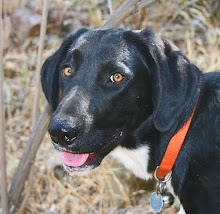
Left to right: California towhee, Lesser nighthawk, rufous-crowned
sparrow, hummingbird impersonator (you tell me), Oak titmouse
Admittedly, they're not much as bird portraits, but they are good enough to identify water hole guzzlers.
Sage sparrows showing age-sex differences in plumage.
Examining 400+ photos is a lot of work, and poor picture quality means more work, because you have to drag the jpg from IPhoto to Photoshop to eyeball it up close.
Here is a summary.
If you just count frames, California towhees placed first as the most photographed bird, with California and Mountain quail placing second and third.
Oak titmice were often seen clinging to a timber waiting to dash in for a quick drink.
We got only one frame of the Lesser nighthawk -- seen at the top of the page drying out after a bath -- and two frames of a white-breasted nuthatch.
When the scrub jay visited other birds stayed away.
Frequency of bird and mammal photos at dawn, dusk and night.
For the sake of economy we set the controller for night pictures, so we don't know what species visited Poison Water during the warm hours of the day.
A northern flicker butts in on the quail for a drink of bathwater.
The camera still operated in low light -- becoming active around 7:00PM when there was a flurry of bird activity and turning off just before 7:00AM.
It is tempting to set the camera for round-the-clock activity.
That gap in the data makes you wonder who shows up in the heat of day.






7 comments:
Cool shots codger! I dig the Sage Sparrow portrait. Looks like a busy watering hole.
Is there any chance that the nighthawk could be a Common Poorwill? Nighthawks have pretty conspicuous white patches toward their wingtips.
It could well be. Both species have been recorded at Chimineas by real birders (rather than the likes of me). Truth be told, I compared it with the pictures in Sibley, and pondered the wing bars and tail lengths. I went with Lesser nighthawk because the tail looked long.
What a great spot Codger. Are you planning on trying a camera for the full 24/7 to see what drops in during the day?
Love oak titmouses - I have a darling pair that lives in a nearby oak and comes daily to bathe in my fountain and clean the bugs off my cactus. :)
I'm a titmouse fan too. Charming little guys and clever too.
Loving the bird pics!!
Stay tuned, Bill, there's a bit more on its way.
I think the Poorwill/Nighthawk is a Spotted Towhee. You can see a little rufous on the flank. It looks weird like it might be shaking the water off after a bath.
Post a Comment